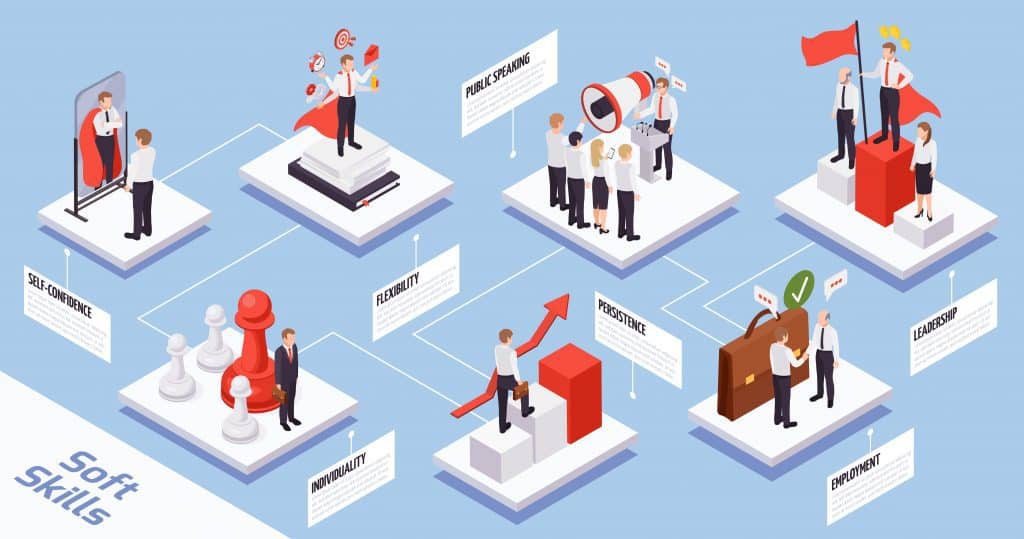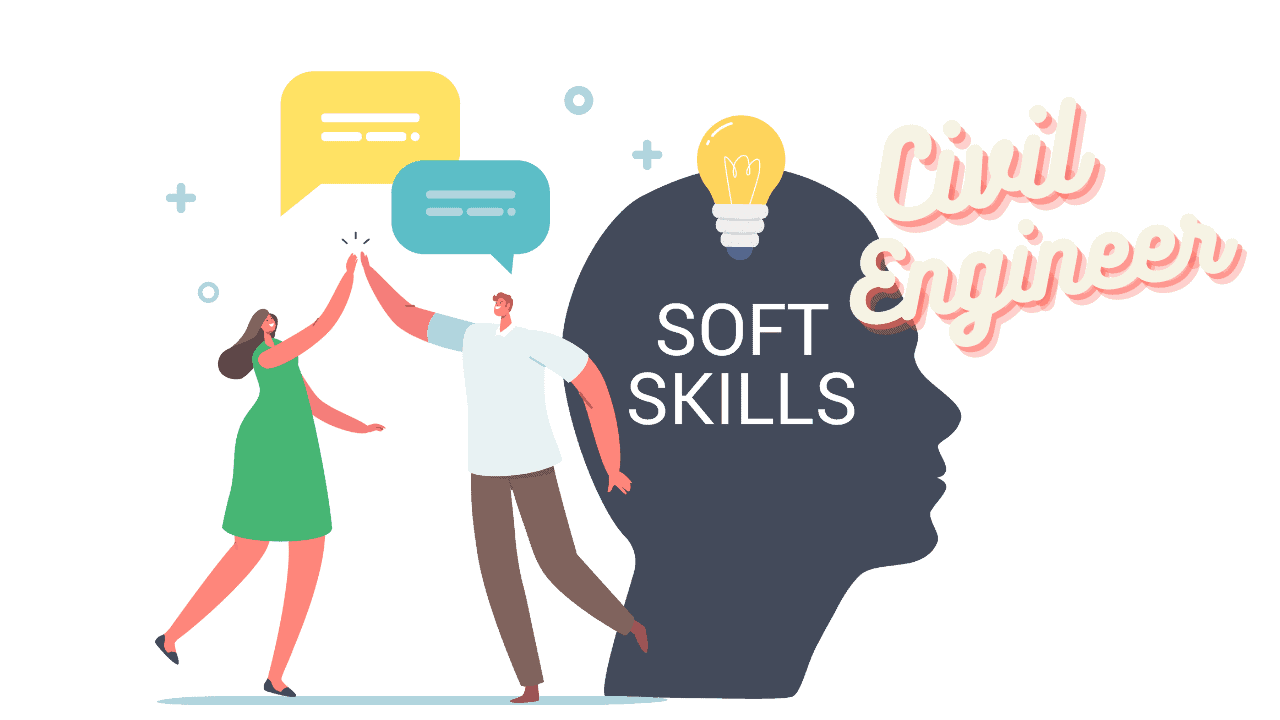Engineers need to have a wide range of soft skills in order to succeed in their careers. This includes interpersonal skills like communication and listening, leadership qualities like empathy and problem-solving abilities, and more. These are the soft skills for engineers to hone are they grow in their careers.
Today, civil engineers are often asked to work in different areas and divisions within the organization, and soft skills are the tool that can help you stand out in an industry that is very competitive.
Although civil engineers need to have technical expertise that is specific to the job, soft skills are what will distinguish one engineer from another with the same technical skills.
As a civil engineer, there are soft skills that you need to excel in your job, but which ones are most valued, and which will help you get the job you want?
What Are Soft Skills for Engineers?
Soft skills are skills related to how you communicate with others, lead, solve problems, manage your work, interact, and other skills that aren’t a part of your technical know-how. If a person has excellent civil engineering industry and technical skills, but they don’t communicate well or manage time well, they may not be as valuable to a company as another civil engineer who does.
If you want to be successful, soft skills will set you apart and become part of your reputation. They will play a role when companies check your references, and they show that you have the skills and the ability to manage them for success. In fact, with the advances of AI, there is an even greater need for soft skills, which gives the human element to data analysis that is studied by tech.
The issues that are facing businesses today only increase the need for soft skills, and this need is expected to grow in the next ten years.
What Are the Most Important Soft Skills for Civil Engineers?

Whether you are preparing for your next job interview or working your way up the career ladder, these are the most important soft skills to emphasize. This is what employers are looking for today and what the engineering future is heading.
Soft skills for civil engineers are communication, leadership, influence, lateral thinking, problem-solving, teamwork, adaptability, work ethic, and time management.
1. Communication
One of the most important soft skills in civil engineering is strong, effective communication skills. As an engineer, you may be called on to explain technical information to an audience that lacks technical knowledge. You should be able to communicate this information in a way that the non-experts can understand what you are saying. Learn how to discuss your engineering work in a way that is accessible to others.
There are specific characteristics that define clear communication, and the more of these characteristics you master, the better your ability to communicate will be perceived. You should work on all of the following as part of the process of improving your communication skills:
- Active listening
- Adaptability
- Confidence
- Assertiveness
- Clarity
- Emotional intelligence
- Empathy
- Feedback
- Body language
- Open-mindedness
- Patience
- Simplification
- Story-telling
2. Leadership

Another soft skill that employers are looking for is leadership qualities. If you can show that you have the skills to have the potential for management, you will be in good shape. This includes the skills to manage teams, individuals, or projects. If you have natural leadership skills, that is great, but you can get training and work on developing your skills. This is important when you interview because it shows that you have the potential to move up within the company.
3. Influence
Being able to negotiate and influence others is an important soft skill. People who have influence are able to bring teams together and present ideas in a persuasive way. This is important as a civil engineer because you can push projects to success together with your team. They are looking for someone who knows how to present ideas in a persuasive way with confidence. This also includes being decisive when it is called for.
4. Lateral Thinking
Lateral thinking is the ability to come up with unique and original answers to difficult questions outside of logical reasoning. It is a creative process that is necessary when the logical answer isn’t working. When you have this skill, you can find solutions that aren’t obvious. This skill comes in handy when there is a crisis because you need to come up with solutions outside of the normal parameters.
5. Problem-Solving Skills

Employers are always looking for people with excellent problem-solving skills. In business, and especially in engineering, there are problems that will come up without any immediate solution. You need to be able to take a creative approach and be innovative in finding an effective solution.
6. Teamwork
Teamwork is more and more important in engineering, as companies are using more collaborative efforts to accomplish tasks in projects. It is important to show that you have the skills to work well with others to achieve a common goal. Employers are looking for team players for several reasons, including the following:
- Less conflict among employees
- Higher employee retention
- Better ability to draw top talent

It can be difficult to be a team player when you are an expert in your field, but it is important to learn how to listen to others and include them in projects. The reality is that everyone has something to offer, and developing collaborative teamwork skills will make you a more attractive prospect to employers.
7. Adaptability
Adaptability is an important soft skill because the workplace is constantly changing. There will be new clients, new team members, a new working environment (such as working remotely), and possibly new circumstances, and they want people who can adapt to these changes.
A civil engineer should show abilities to adapt by being interested in new training sessions and learning new skills. Show employers that you embrace change and always look to learn from new experiences. They want to see a positive reaction so that they know that transitions will be easier for everyone.
8. Work Ethic
Employers always want to find people who have a work ethic. These people are punctual and organized, and they are reliable. They meet deadlines and remain focused on tasks that need to get done. They are able to work independently while still sticking to the overall plan.

Having a strong work ethic is something that comes naturally to some people, but it has to be developed and cultivated. It is about holding yourself to a high standard of responsibility. Civil engineers with a strong work ethic are productive, professional, and persistent, and they have great time management skills.
9. Time Management
Time management skills allow you to get your work done efficiently. It is the ability to delegate your time for different tasks throughout the day. Most civil engineers who have good time management skills create a list and allocate specific periods of time to each task. They are able to learn through experience how to tweak their schedules so that they can get everything done.
This leads to greater productivity, and you will forget fewer items throughout the day. You will learn how to prioritize tasks so that you accomplish them before they become urgent, and you will be able to delegate tasks to others when it is possible.
How Can You Show-off your Soft Skills in a Job Interview?

The trick to showing off your soft skills is that you will want to show them rather than talk about them. Your prospective employer will be looking for evidence of these skills in how you present yourself and how you approach the questions you are asked. Many people don’t realize that interview questions are often designed to find out if someone has these skills.
Before your interview, outline the soft skills the job requires and align these to your existing skills. Think about where you have used those skills, how they impacted your job performance and how you succeeded in overcoming project challenges. For example, if you faced a crisis and came up with solutions to get through it, find a way to work it into the interview. You may be asked if you have any examples of this kind, so be prepared to talk about them.
Your entire interview will show off your communication skills. You should make sure that you show that you have the technical skills, but you can also talk about it with a non-expert. Being able to communicate effectively in the interview will separate you from other applicants. This is a great way to make sure that you stand out and rank higher in the interview process.
How Can Civil Engineers Improve their Soft Skills?
One way that civil engineers can improve their soft skills is through training courses. However, you can improve them through experience as well. If you are open to taking on leadership roles, you will be able to develop a number of soft skills that are critical to success. You should make sure that you embrace feedback so that you can see your performance as others see it. Regular communication allows you to improve your communications skills, and try to get outside of your comfort zone when you are at work.
The most important thing is to stay adaptable and flexible so that you can learn from your experiences. When you have an open mind, there is a lot that you can absorb. You don’t need to mimic someone else’s behavior, but you can take the experiences you have and come up with the best way for you to fit into a team.
Summary
Companies are becoming more and more interested in soft skills. Soft skills are often overlooked but are essential for success in any engineering field. As a Civil Engineer, you need to know how to work on a team, how to communicate effectively, and how to solve complex problems that require collaboration. The engineering industry is growing rapidly and it is expected to be the fastest-growing occupation in the United States. With a shortage of qualified engineers, companies are looking for people who have more than just technical skills. Engineers who have excellent soft skills will have an edge over their competition.
